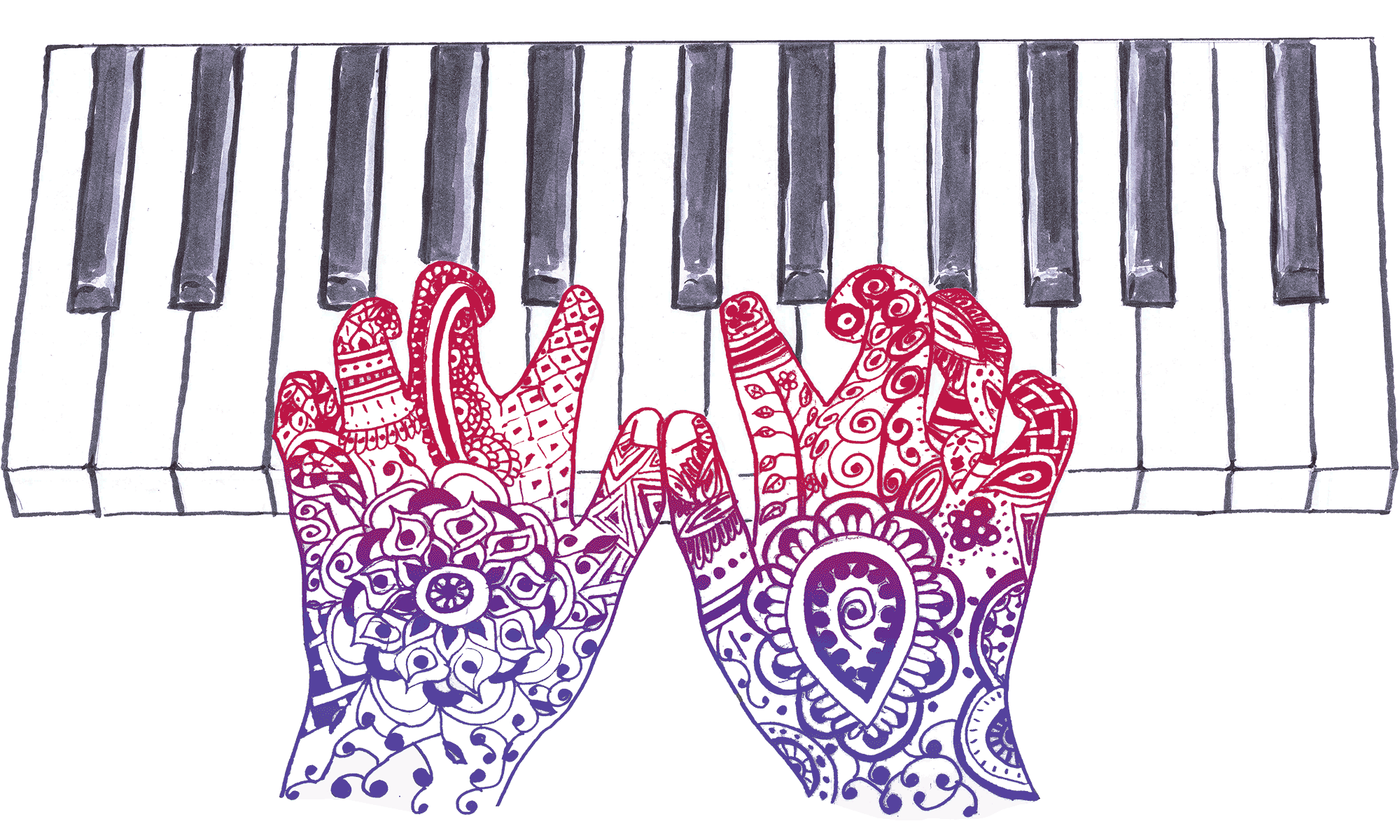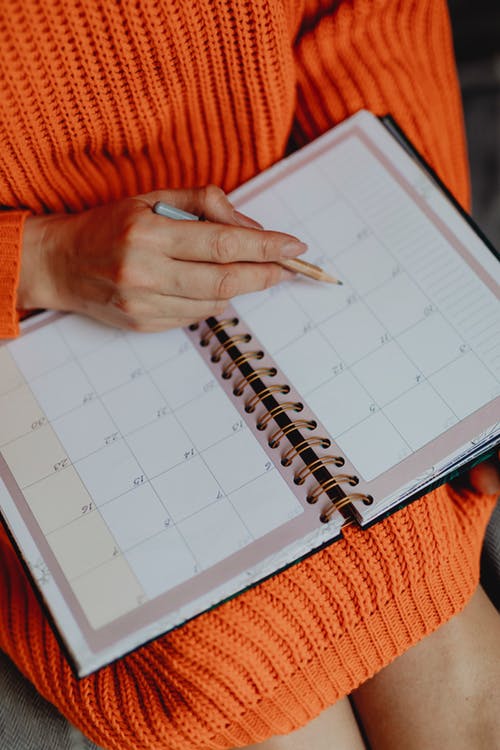Fit Learning Into Your Life (Part 2)
Once you’ve gone through ‘How to Fit Learning Into Your Life (Part 1)’ and filled out the calendar, you’re ready to get to the details!
What is it you want to learn?
- Think of a big picture goal. Be careful not to make your big goal too nebulous. For instance, “I want to learn to play the piano.” Maybe instead your big goal would be “I want to be able to play piano for enjoyment.” If you just have “I want to learn to play piano” you haven’t given yourself a goal that can ever be met because there isn’t a specific criteria for what that means. Would you consider playing Yankee Doodle having learned how to play piano? Technically it is but it probably isn’t what you were thinking when you imagined yourself playing piano and it won’t feel satisfying. It’s important not to set an open ended goal that can’t be met. It should have clear criteria for what it means to meet it.
- Think of a smaller, detailed goal, such as; “I want to learn to play Fur Elise.” or “I want to play and sing Let it Be.”
Don’t start making excuses yet why you can’t! This is the fun part where you daydream about what you’d like to learn assuming you had no obstacles. Don’t say ‘no’ to an idea before you’ve even considered if it’s possible.
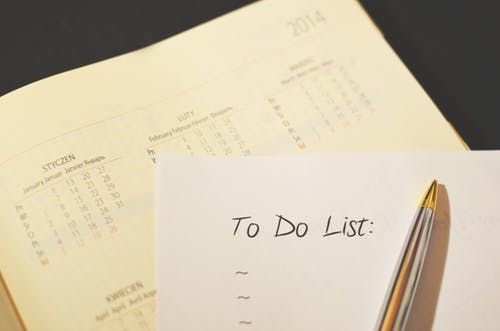
This is where a lot of people stop themselves before they begin because they only give themselves a big picture goal. This feels overwhelming and doesn’t give them an idea of where to start. Giving yourself a small goal, gives you an easy success and a first step. The first step often leads you to your next step if you don’t already know what it is. It narrows your goals down to specifics that will allow you to figure out what tools, skills or information you will need to learn in order to do it.
Why do you want to learn it?
This is a really important part of the puzzle. If you can articulate how learning this thing is going to give you something you want or make your life better, this will give you your own mantra. You can recite it to yourself when you need a little push or to put things back into perspective. Your perspective needs to match your goals or you won’t be satisfied with the results or be able to fit it into your life. People often don’t realize they are hanging on to unrealistic expectations of themselves and forget why they are learning something in the first place. It’s all that programming from childhood that’s designed to make us good little worker bee students. Having a perspective that matches your goals will help get all of your brain on board with your plan. I’ll talk about that more below.
Don’t rely on willpower to practice or study!
Wow, I’m going against what every teacher since the beginning of time tells you. Hear me out! Willpower takes concentrated focus and effort. Our brains are not designed to run off of willpower 24/7. It’s meant to give a temporary boost to get through a short term challenge not be your way of being. That being the case, if you are relying on willpower, you will only be able to keep it up for so long before it fails.
Willpower is linked strongly to your confidence and energy level in the moment. Do you feel confident and energetic 100% of the time? I don’t. I have “Yes, I can do this!” days where I’m unstoppable. I also have “No, go away…” days where I don’t want to face anything. So what happens when you rely on willpower for the long term? You not only fail at your goal but you feel bad about yourself. You may pick yourself up a few times and try again but eventually you want to stop feeling bad about yourself so you give up altogether on the goal. Feeling guilty or disappointed in yourself is counterproductive because it usually leads to quitting and it was definitely not make learning ENJOYABLE!

Have you ever wondered why it can be so hard to feel motivated to do something that you want?
In her book, This Year I Will, M.J. Ryan gives great insight about why you need to get your logical brain and your animal brain on the same page in order to build or change habits. (I’m paraphrasing, so forgive me M.J.) Since the animal part of your brain is automatic and there to help you survive, the second you’re not exercising willpower, it takes over and reverts to looking for safety or pleasure. If you can appeal to those drives, you won’t be as likely to feel like you have to fight to stay motivated. Although some people have more willpower than others, no one can keep that focused will power going every second of the day.
Make sure your plan and goals align with how you want learning to fit in your life!
For instance, let’s say your reason for learning the piano is in order to be able to enjoy playing music at the end of the day. It may be purely for enjoyment or to de-stress. Knowing that means you won’t need to set up a practice schedule as if you are planning to be a concert pianist. You may think that is obvious but if you are taking lessons or learning from someone who is, they may not be really customizing your plan to your goals. If they practice six hours a day, it may not seem like a big deal to ask you to practice an hour a day but I know as a piano teacher that most people (especially adults) don’t have an hour to practice every day. Adult students in particular, can be really hard on themselves. It’s important to remember that learning an instrument should ADD to your life not give you another reason to feel guilty.
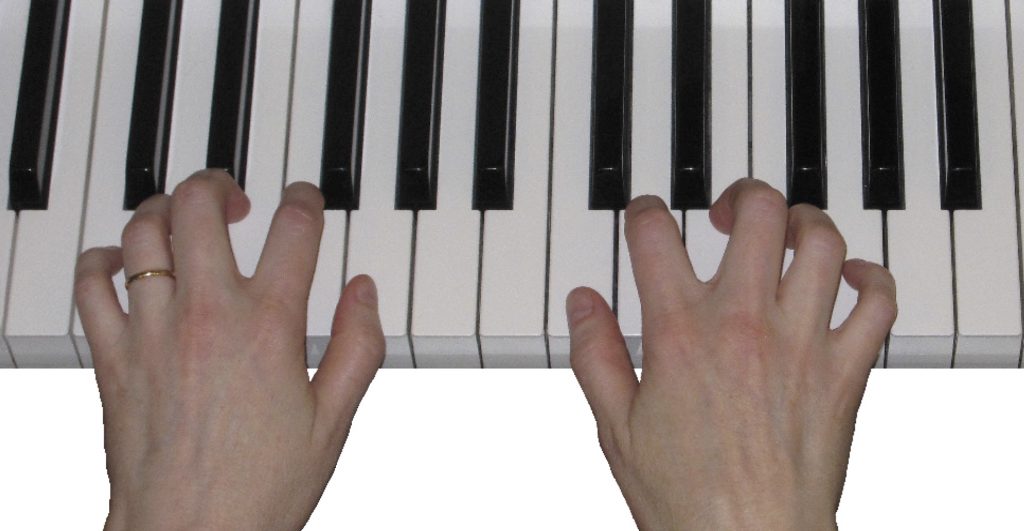
Make practicing part of a habit you already have.
Whether it’s practicing an instrument, a language or any other information or skill, you need to find a way to make it part of a habit you already have. If you have to make the decision to do it, you will find it doesn’t happen very often.
Whether you are a morning or night person might also play into your plan. If you work it into a routine where you’re already naturally at your best you’re more likely to do it regularly.
One of the most important ways that our brains commit things to long term storage is by revisiting them often regularly over time. If that scares you, then that means you are already thinking about taking on too much information at once.

Only introduce a few things at a time!
I go in depth about this in the guest blog I did on Musical.U called “The magic number and how to use it to learn anything.” Your working memory holds a few things in storage just long enough to do something in the moment. Let it help you out. Experts disagree about how many things this. Some say five to seven things. More recent thoughts are that it is three to five. I personally have found three to be ideal for most things.
Introduce a few things and stick to them until they are mastered before moving on. This not only makes learning feel easy and less tiring, which increases your chances of sticking to it, it is also more effective. Learning by overwhelm is frustrating, exhausting and actually takes longer to master the same information. You need to give your brain time to encode and process how information fits into a bigger framework.
Don’t be fooled that you have mastered something because you seem to know it well at the end of a study/practice session. That’s probably your short term memory. Only if you can come back to it later and it’s still just as solid the first time you use it, are you on your way to committing it to long term memory. It will take a longer period of time of regularly using the information before it will truly be mastered.
Plan for a reasonably small amount of time.
If you do this, you can honor it regularly and it will seem manageable. If it feels like it will take a lot of effort, you will be discouraged from starting it. Knowing that it’s a small commitment will make you less likely to put it off.
You can decide once you are there whether you want to or can stay longer. Don’t push yourself to stay too long beyond when it feels good. Stamina builds slowly over time and is easier once you have a foundation. When everything is new, things feel tiring quicker. You want to make it an enjoyable process. Not only is that so you enjoy it but because your psyche WILL remember if it stopped feeling fun and will want to avoid it next time!
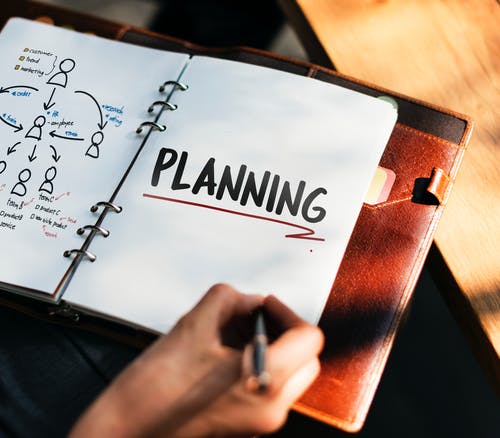
Make a plan that gradually scales in difficulty.
Don’t plan to do something that feels so taxing that it takes you being at your absolute best to do it. You will grow much faster, from regularly revisiting information than from trying to rocket ahead by overwhelming yourself with information. Ultimately, you want what you learn to be lasting not temporary.
Plan a part of your practice that is just for enjoying what you’ve already learned.
In music this is easy; play pieces you already know and like. If you are learning knitting, this part might just be working on something that has a lot of repetition and isn’t something that requires paying close attention to a pattern or counting.
Put your new learning into real world use.
Make sure you are using the thing you are learning to accomplish a project and do something in the real world. An important part of understanding and learning happens when you take information or a skill and use it do something. Have you ever read some instructions and think “Oh, this is simple. I got this.” Then you try to do the thing following the instructions and you realize there are some holes in your understanding? Yep. This is normal. You won’t find out where your understanding is murky until you dive in and do the thing!
Real world use is also important because it gives you satisfaction and a sense of purpose for your learning. You need the pay off! I feel super excited and smart when I learn something new and then I’m able to DO SOMETHING I couldn’t before. Especially if I get to create something out of my imagination using this new information. Now I have something concrete to show for my work and I feel good about myself. Those are both things that will help propel you forward for more learning.
Plan part of your time to Drill on information and part of your time to Use it.
Don’t just spend all of your time on either one or the other. Do a little of both. They are compatible with each other and will help you solidify information and be able to do things right away.
Give yourself some flexibility!
Plan for a maximum and minimum number of times a week. For instance, shoot for five but have your hard goal be three. This gives you some flexibility for things that come up without derailing your whole plan. The upside to this is that if you exceed your soft goal, it feels like you’ve gone above and beyond. You can achieve your hard goal while still giving yourself room for not feeling good or things that unexpectedly come up without feeling like you’ve let yourself down.

Time to get to the details!
Below you’ll find a downloadable worksheet with questions that will help you brainstorm and make a plan. This will help you articulate what you want to learn and how you are going to get there.
Fit Learning Into Your Life Worksheet
After you fill out the worksheet you should have all of the information you need to fill out your checklist.
Fit Learning Into Your Life Checklist
When you’ve filled out the worksheet, look at your calendar (from part one) and see where you can fit your learning tasks in during the week. Here’s an example below of the checklist filled out.
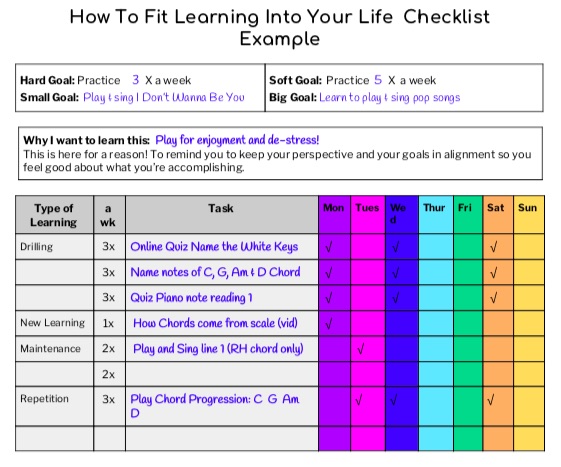
Happy learning!
Also published on Medium.
